美国总统年度国情咨文_一个长达212年的传统
2011.1美国总统奥巴马2011年国情咨文英汉双语
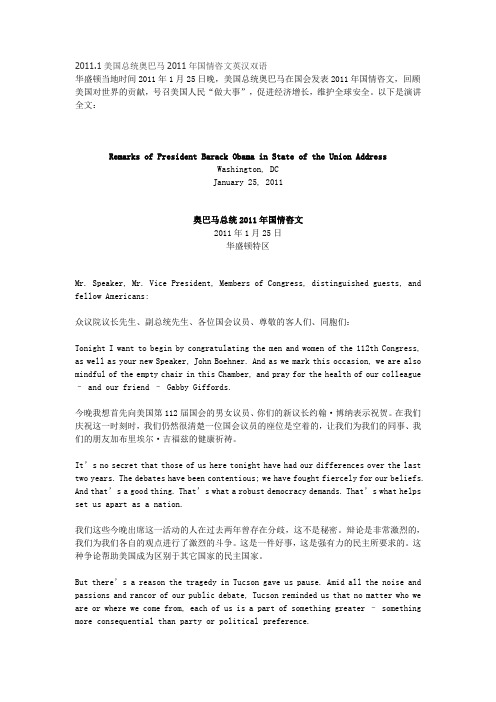
2011.1美国总统奥巴马2011年国情咨文英汉双语华盛顿当地时间2011年1月25日晚,美国总统奥巴马在国会发表2011年国情咨文,回顾美国对世界的贡献,号召美国人民“做大事”,促进经济增长,维护全球安全。
以下是演讲全文:Remarks of President Barack Obama in State of the Union AddressWashington, DCJanuary 25, 2011奥巴马总统2011年国情咨文2011年1月25日华盛顿特区Mr. Speaker, Mr. Vice President, Members of Congress, distinguished guests, and fellow Americans:众议院议长先生、副总统先生、各位国会议员、尊敬的客人们、同胞们:Tonight I want to begin by congratulating the men and women of the 112th Congress, as well as your new Speaker, John Boehner. And as we mark this occasion, we are also mindful of the empty chair in this Chamber, and pray for the health of our colleague – and our friend – Gabby Giffords.今晚我想首先向美国第112届国会的男女议员、你们的新议长约翰·博纳表示祝贺。
在我们庆祝这一时刻时,我们仍然很清楚一位国会议员的座位是空着的,让我们为我们的同事、我们的朋友加布里埃尔·吉福兹的健康祈祷。
It’s no secret that those of us here tonight have had our differences over the last two years. The debates have been contentious; we have fought fiercely for our beliefs. And that’s a good thing. That’s what a robust democracy demands. That’s what helps set us apart as a nation.我们这些今晚出席这一活动的人在过去两年曾存在分歧,这不是秘密。
浙江省2020年高三上学期历史第一次月考试卷C卷
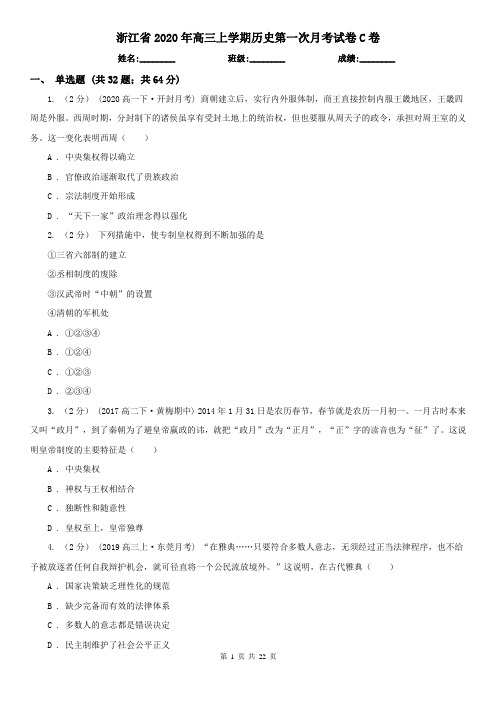
浙江省2020年高三上学期历史第一次月考试卷C卷姓名:________ 班级:________ 成绩:________一、单选题 (共32题;共64分)1. (2分) (2020高一下·开封月考) 商朝建立后,实行内外服体制,商王直接控制内服王畿地区,王畿四周是外服。
西周时期,分封制下的诸侯虽享有受封土地上的统治权,但也要服从周天子的政令,承担对周王室的义务。
这一变化表明西周()A . 中央集权得以确立B . 官僚政治逐渐取代了贵族政治C . 宗法制度开始形成D . “天下一家”政治理念得以强化2. (2分)下列措施中,使专制皇权得到不断加强的是①三省六部制的建立②丞相制度的废除③汉武帝时“中朝”的设置④清朝的军机处A . ①②③④B . ①②④C . ①②③D . ②③④3. (2分) (2017高二下·黄梅期中) 2014年1月31日是农历春节,春节就是农历一月初一。
一月古时本来又叫“政月”,到了秦朝为了避皇帝嬴政的讳,就把“政月”改为“正月”,“正”字的读音也为“征”了。
这说明皇帝制度的主要特征是()A . 中央集权B . 神权与王权相结合C . 独断性和随意性D . 皇权至上,皇帝独尊4. (2分) (2019高三上·东莞月考) “在雅典……只要符合多数人意志,无须经过正当法律程序,也不给予被放逐者任何自我辩护机会,就可径直将一个公民流放境外。
”这说明,在古代雅典()A . 国家决策缺乏理性化的规范B . 缺少完备而有效的法律体系C . 多数人的意志都是错误决定D . 民主制维护了社会公平正义5. (2分)“如果在夜里行窃的人被人当场杀死,则这种杀人的行为被认为是合法的。
”(《十二铜表法》第八表,第十二条)以上规定反映的实质是()A . 罗马法十分残酷野蛮B . 维护私有财产C . 此法典保护了雅典人民的利益D . 重视良好道德的培养6. (2分) (2018高一上·深圳月考) 近代英国确立了议会君主制,美国确立了总统共和制,德国确立了二元君主制,法国确立了“总统制和议会制的混合制度”。
共和旋律与民粹魅影:美国总统安德鲁·杰克逊执政风格剖析
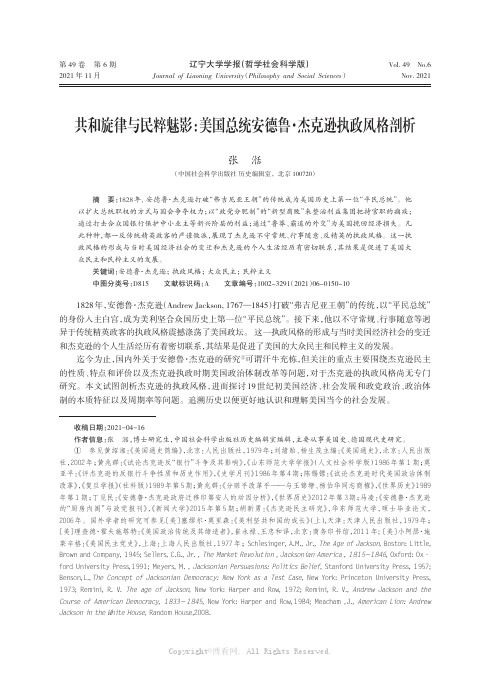
共和旋律与民粹魅影:美国总统安德鲁·杰克逊执政风格剖析张湉(中国社会科学出版社历史编辑室,北京100720)摘要:1828年,安德鲁·杰克逊打破“弗吉尼亚王朝”的传统成为美国历史上第一位“平民总统”。
他以扩大总统职权的方式与国会争夺权力;以“政党分肥制”的“新型腐败”来整治利益集团把持官职的痼疾;通过打击合众国银行保护中小业主等新兴阶层的利益;通过“鲁莽、霸道的外交”为美国挽回经济损失。
凡此种种,都一反传统精英政客的严谨做派,展现了杰克逊不守常规、行事随意、反精英的执政风格。
这一执政风格的形成与当时美国经济社会的变迁和杰克逊的个人生活经历有密切联系,其结果是促进了美国大众民主和民粹主义的发展。
关键词:安德鲁·杰克逊;执政风格;大众民主;民粹主义中图分类号:D815文献标识码:A 文章编号:1002-3291(2021)06-0150-101828年,安德鲁·杰克逊(Andrew Jackson,1767—1845)打破“弗吉尼亚王朝”的传统,以“平民总统”的身份入主白宫,成为美利坚合众国历史上第一位“平民总统”。
接下来,他以不守常规、行事随意等迥异于传统精英政客的执政风格震撼涤荡了美国政坛。
这一执政风格的形成与当时美国经济社会的变迁和杰克逊的个人生活经历有着密切联系,其结果是促进了美国的大众民主和民粹主义的发展。
迄今为止,国内外关于安德鲁·杰克逊的研究①可谓汗牛充栋,但关注的重点主要围绕杰克逊民主的性质、特点和评价以及杰克逊执政时期美国政治体制改革等问题,对于杰克逊的执政风格尚无专门研究。
本文试图剖析杰克逊的执政风格,进而探讨19世纪初美国经济、社会发展和政党政治、政治体制的本质特征以及周期率等问题。
追溯历史以便更好地认识和理解美国当今的社会发展。
收稿日期:2021-04-16作者信息:张湉,博士研究生,中国社会科学出版社历史编辑室编辑,主要从事美国史、德国现代史研究。
扬州市武坚中学2014年中考第一次模拟考试历史试卷(含答案)

九年级历史试卷2014.4(本试卷考试时间为60分钟,分值为50分开卷)注意:请同学们将答案全部写在答题卡上第Ⅰ卷选择题(共25分)一、选择题:本大题共25小题,每题1分,共25分。
每小题给出的四个选项中,只有一项最符合题目要求。
1.《荀子·儒效篇》记载:“(周公)兼制天下,立七十一国,姬姓独居五十三。
”可见同姓亲族是分封的主体。
这些同姓亲族受封时,周王会给予他们A.土地和耕牛 B.土地和人口 C.封号与耕牛 D.奴隶和铁犁2.《史记》记载,秦孝公死后,太子即位,守旧的贵族诬告商鞅“谋反”,商鞅也因此遭遇了车裂的命运。
这主要是因为商鞅变法触动了大贵族的利益。
商鞅变法内容中,最能触动大贵族利益的是A.国家承认土地私有 B.允许土地自由买卖C.根据军功大小授予爵位和田宅 D.建立县制3.在2008年奥运会开幕式的舞台上,演员们手持竹简高声吟唱“四海之内,皆兄弟也”,并多次出现巨大的“和”字。
它所蕴涵的思想同“仁”、“礼”一脉相承,都源于A.法家 B.道家 C.儒家 D.墨家4.右图建筑于2013年3月基本完工,它是目前世界最高的露天阿弥陀铜制像。
与这一建筑有关的宗教是A.佛教 B.犹太教 C.基督教 D.伊斯兰教5.某电视剧摄制组根据剧情布置了一个曹操的书房情景,其道具有四样,根据史实判断其中搞错的是①书桌上有一卷纸②墙上挂有《魏国疆域图》③桌上有《史记》一书④书柜中摆放着印制的书籍A.①② B.③④ C.①③ D.②④6.改革是兴利除弊、振兴国家的重要手段。
下列措施有利于孝文帝加强对黄河流域控制的是A.说汉话 B.鲜卑族改穿汉族服装 C.迁都洛阳 D.鲜卑贵族与汉族贵族通婚7.隋朝,犹如一颗流星划过历史的天空,时间虽然短暂,却光芒四射。
下列有关隋朝历史贡献的叙述,不正确的是A.实现了南北重新统一 B.开通了纵贯南北的大运河C.创设了科举制度 D.开创了“贞观之治”的局面8.“东瀛有多远?芒履难丈量。
人民版历史选修3:专题六专题过关检测

(时间:90分钟,满分:100分)一、选择题(每小题4分,共40分)1.近年来,国际上悄然兴起一股温和之风,“伙伴关系”多现报端,冷战时期那种两极对立、剑拔弩张的气氛,正在为二种“碰撞中磨合”“竞争中协调”的新型国际关系所取代。
这种变化表明()A.国际政治经济新秩序已经确立B.一些大国放弃了战争手段,用温和手段开展外交C.随着世界经济一体化,各国利益趋同D.合作比对抗更有利于各国利益的实现解析:选D。
A项不成立,当今世界新的国际政治经济秩序仍未建立;B项说法不能体现材料的实质涵义,只是表象;C项说法错误;D项最符合题意。
2.美国总统奥巴马在国情咨文中说:“美国政府在过去几十年一直在等待,即使美国存在的问题日益恶化。
与此同时,中国却没有等待,实施经济改革。
德国、印度也没有等待。
这些国家没有原地踏步,也不想成为次要国家。
……我无法接受美国成为二等国家。
”这表明()A.一超多强的格局被打破B.美国已沦为二等国家C.新的国际格局已经确立D.多极化趋势正在加强解析:选D。
本题考查学生阅读理解材料并结合所学知识分析解决问题的能力。
东欧剧变、苏联解体后,两极格局被打破,世界格局的多极化趋势加强,当前的国际关系格局表现为“一超(即美国)多强”,新的世界格局尚未形成,故A、B、C错误。
材料内容反映中国、印度等国家的崛起,反映了世界多极化趋势的加强。
本题的正确答案是D。
3.温家宝总理强调指出:“我们将始终不渝地奉行独立自主的和平外交政策。
”中国政府始终不渝地奉行这一政策的根本目的是()A.加强同广大发展中国家的合作B.促进世界的和平与发展C.维护世界和平,为现代化建设创造良好的外部环境D.反对霸权主义,维护国家主权解析:选C。
A项不属于外交政策的目的,B、D两项都不是根本目的。
4.二战后存在两种比较突出的现象,一是各类经济组织(如欧盟、亚太经合组织等)举行与经济有关的峰会(如G20峰会)大大增加,二是军事冲突此起彼伏(如伊拉克战争、利比亚战争等)。
【人教版】高中政治选修三:3.3《美国的三权分立》ppt课件

首 页
X 新知导学 Z 重难探究
INZHI DAOXUE
HONGNAN TANJIU
D 当堂检测
ANGTANG JIANCEI
一
二
三
主动思考读图请回答:
三权分立就是三种权力彼此分立,独立行使,互不相干。这种说法对吗? 提示:不对。 三权分立既指三种权力彼此分立,国家的立法权、 行政权、 司法权分别由议会、政府和法院独立行使,同时三种权力又相互制约,保持 权力均衡。
首 页
X 新知导学 Z 重难探究
INZHI DAOXUE
HONGNAN TANJIU
D 当堂检测
ANGTANG JIANCEI
一
二
三
提醒
立法、行政、司法机关三者彼此平等、独立,共同组成中央政权机构。 三个部门的权力来源各不相同,相互之间没有政治上的责任;三个机关的成 员不得相互兼职,实行所谓“不相容的原则”。
首 页
X 新知导学 Z 重难探究
INZHI DAOXUE
HONGNAN TANJIU
D 当堂检测
ANGTANG JIANCEI
一
二
三
三、三权分立的利弊
1.三权分立制的积极作用 三权分立和权力制衡的原则,对于反对封建专制,调节资产阶级内部各 集团的利益,维持资本主义民主制度,有其积极作用。 2.三权分立制的阶级局限性和消极作用 (1)所谓分权与制衡,事实上成为协调资产阶级内部权力分配的一种机 制。 (2)实行三权分立、权力制衡的一个必然结果,是三大权力机关之间互 相扯皮,导致效率低下。
3 美国的 三权分立
-* -
首 页
X 新知导学 Z 重难探究
INZHI DAOXUE
HONGNAN TANJIU
奥巴马国情咨文
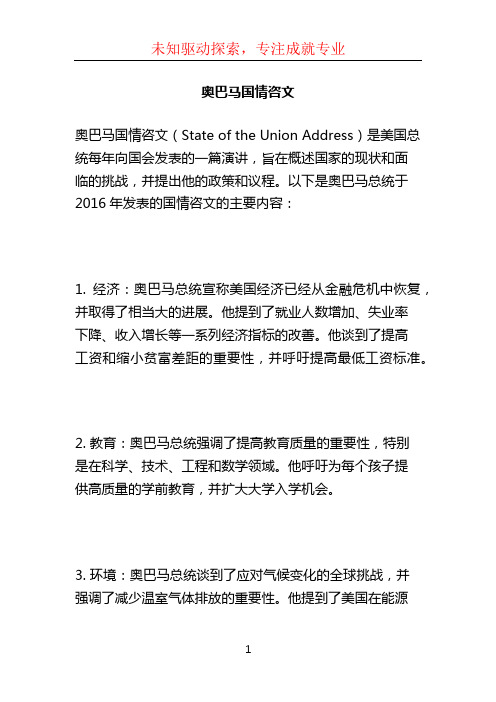
奥巴马国情咨文奥巴马国情咨文(State of the Union Address)是美国总统每年向国会发表的一篇演讲,旨在概述国家的现状和面临的挑战,并提出他的政策和议程。
以下是奥巴马总统于2016年发表的国情咨文的主要内容:1. 经济:奥巴马总统宣称美国经济已经从金融危机中恢复,并取得了相当大的进展。
他提到了就业人数增加、失业率下降、收入增长等一系列经济指标的改善。
他谈到了提高工资和缩小贫富差距的重要性,并呼吁提高最低工资标准。
2. 教育:奥巴马总统强调了提高教育质量的重要性,特别是在科学、技术、工程和数学领域。
他呼吁为每个孩子提供高质量的学前教育,并扩大大学入学机会。
3. 环境:奥巴马总统谈到了应对气候变化的全球挑战,并强调了减少温室气体排放的重要性。
他提到了美国在能源发展和可再生能源方面取得的进展,并呼吁继续支持清洁能源和环保措施。
4. 健康保险:奥巴马总统回顾了他的签署的医疗改革法案,即奥巴马医改法案(Affordable Care Act),并宣称该法案在提供保险覆盖和改善医疗质量方面取得了显著成果。
他呼吁继续保护医疗保险制度,并寻求进一步改进。
5. 移民:奥巴马总统谈到了移民改革的重要性,并呼吁通过立法来解决移民问题。
他提出了一项计划,即为非法移民提供合法身份,并强调了移民对经济和社会的贡献。
这些仅仅是国情咨文的一部分内容,奥巴马总统还提到了其他许多议题,包括国家安全、反恐斗争、外交政策等。
国情咨文是总统向国会和全国人民传达他们的政策目标和愿景的重要机会,也是合作和讨论的起点。
奥巴马新任期首份国情咨文
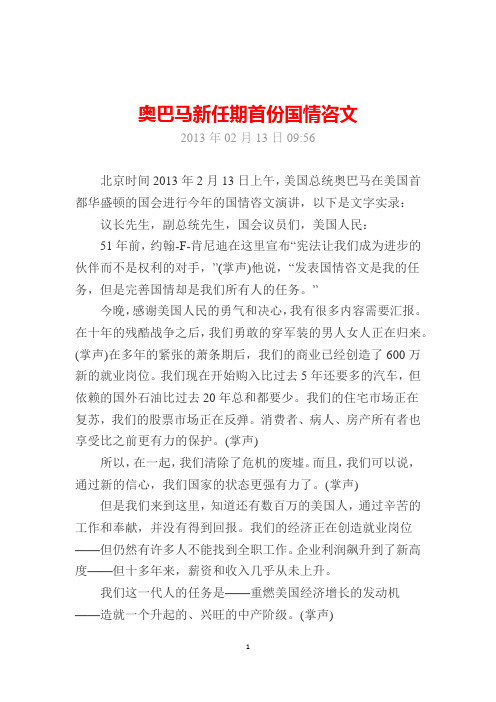
奥巴马新任期首份国情咨文2013年02月13日09:56北京时间2013年2月13日上午,美国总统奥巴马在美国首都华盛顿的国会进行今年的国情咨文演讲,以下是文字实录:议长先生,副总统先生,国会议员们,美国人民:51年前,约翰-F-肯尼迪在这里宣布“宪法让我们成为进步的伙伴而不是权利的对手,”(掌声)他说,“发表国情咨文是我的任务,但是完善国情却是我们所有人的任务。
”今晚,感谢美国人民的勇气和决心,我有很多内容需要汇报。
在十年的残酷战争之后,我们勇敢的穿军装的男人女人正在归来。
(掌声)在多年的紧张的萧条期后,我们的商业已经创造了600万新的就业岗位。
我们现在开始购入比过去5年还要多的汽车,但依赖的国外石油比过去20年总和都要少。
我们的住宅市场正在复苏,我们的股票市场正在反弹。
消费者、病人、房产所有者也享受比之前更有力的保护。
(掌声)所以,在一起,我们清除了危机的废墟。
而且,我们可以说,通过新的信心,我们国家的状态更强有力了。
(掌声)但是我们来到这里,知道还有数百万的美国人,通过辛苦的工作和奉献,并没有得到回报。
我们的经济正在创造就业岗位——但仍然有许多人不能找到全职工作。
企业利润飙升到了新高度——但十多年来,薪资和收入几乎从未上升。
我们这一代人的任务是——重燃美国经济增长的发动机——造就一个升起的、兴旺的中产阶级。
(掌声)我们的未竟任务是——恢复我们国家的基本协议——如果你工作努力并且负责任,你将会领先于别人,不论你从哪里来,不论你长得怎样,或者爱的是谁。
我们的未竟任务是——政府为大多数人服务,而不是少数人;政府鼓励自由企业、奖励个人的主创性,并且给这个国家的每一个孩子都提供发展的机会。
(掌声)美国人并不期望政府解决所有的问题。
他们不期望在这个议事厅里的我们在所有的事务上有一致的看法。
但是他们期望我们把国家利益放在党派前面。
(掌声)他们期望我们在我们能走做到的议题上形成合理的妥协。
因为他们知道只有当我们一起做这些事的时候,美国才会前进。
拜登总统的国情咨文
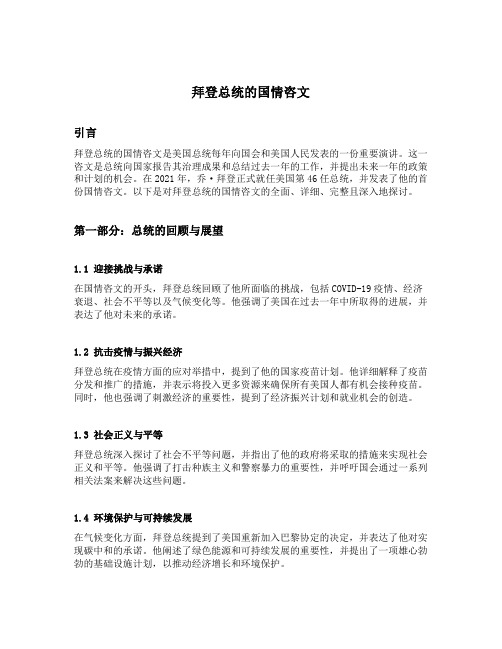
拜登总统的国情咨文引言拜登总统的国情咨文是美国总统每年向国会和美国人民发表的一份重要演讲。
这一咨文是总统向国家报告其治理成果和总结过去一年的工作,并提出未来一年的政策和计划的机会。
在2021年,乔·拜登正式就任美国第46任总统,并发表了他的首份国情咨文。
以下是对拜登总统的国情咨文的全面、详细、完整且深入地探讨。
第一部分:总统的回顾与展望1.1 迎接挑战与承诺在国情咨文的开头,拜登总统回顾了他所面临的挑战,包括COVID-19疫情、经济衰退、社会不平等以及气候变化等。
他强调了美国在过去一年中所取得的进展,并表达了他对未来的承诺。
1.2 抗击疫情与振兴经济拜登总统在疫情方面的应对举措中,提到了他的国家疫苗计划。
他详细解释了疫苗分发和推广的措施,并表示将投入更多资源来确保所有美国人都有机会接种疫苗。
同时,他也强调了刺激经济的重要性,提到了经济振兴计划和就业机会的创造。
1.3 社会正义与平等拜登总统深入探讨了社会不平等问题,并指出了他的政府将采取的措施来实现社会正义和平等。
他强调了打击种族主义和警察暴力的重要性,并呼吁国会通过一系列相关法案来解决这些问题。
1.4 环境保护与可持续发展在气候变化方面,拜登总统提到了美国重新加入巴黎协定的决定,并表达了他对实现碳中和的承诺。
他阐述了绿色能源和可持续发展的重要性,并提出了一项雄心勃勃的基础设施计划,以推动经济增长和环境保护。
第二部分:执政优先事项2.1 公共卫生与健康拜登总统强调了公共卫生和健康的重要性,并提出了一系列政策方案,包括改善医疗体系、降低药品价格和加强疾病预防和控制措施。
2.2 经济复苏与就业经济复苏是拜登总统的一项重要优先事项。
他详细描述了经济振兴计划的目标和措施,并强调了创造就业机会和提高工人收入的重要性。
2.3 教育与技能培训在教育方面,拜登总统提出了一系列改革措施,包括增加教育经费、提高教师工资和改善学校设施。
他还强调了技能培训的重要性,以帮助人们获取未来就业所需的技能。
美国总统国情咨文全程讲稿(中英对照)
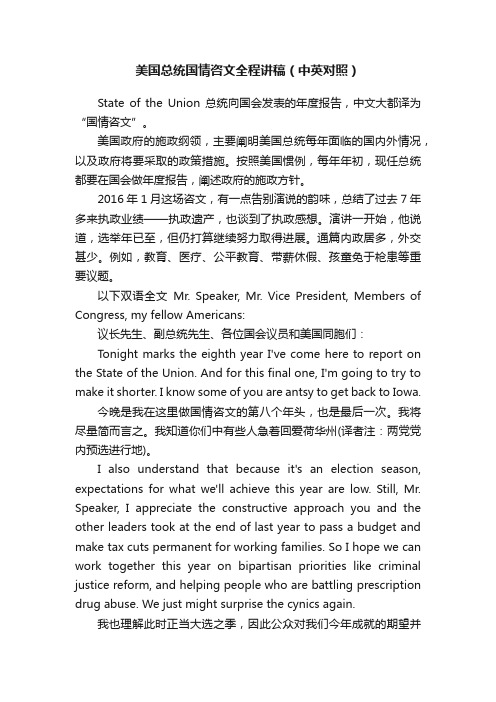
美国总统国情咨文全程讲稿(中英对照)State of the Union 总统向国会发表的年度报告,中文大都译为“国情咨文”。
美国政府的施政纲领,主要阐明美国总统每年面临的国内外情况,以及政府将要采取的政策措施。
按照美国惯例,每年年初,现任总统都要在国会做年度报告,阐述政府的施政方针。
2016年1月这场咨文,有一点告别演说的韵味,总结了过去7年多来执政业绩——执政遗产,也谈到了执政感想。
演讲一开始,他说道,选举年已至,但仍打算继续努力取得进展。
通篇内政居多,外交甚少。
例如,教育、医疗、公平教育、带薪休假、孩童免于枪患等重要议题。
以下双语全文Mr. Speaker, Mr. Vice President, Members of Congress, my fellow Americans:议长先生、副总统先生、各位国会议员和美国同胞们:Tonight marks the eighth year I've come here to report on the State of the Union. And for this final one, I'm going to try to make it shorter. I know some of you are antsy to get back to Iowa.今晚是我在这里做国情咨文的第八个年头,也是最后一次。
我将尽量简而言之。
我知道你们中有些人急着回爱荷华州(译者注:两党党内预选进行地)。
I also understand that because it's an election season, expectations for what we'll achieve this year are low. Still, Mr. Speaker, I appreciate the constructive approach you and the other leaders took at the end of last year to pass a budget and make tax cuts permanent for working families. So I hope we can work together this year on bipartisan priorities like criminal justice reform, and helping people who are battling prescription drug abuse. We just might surprise the cynics again.我也理解此时正当大选之季,因此公众对我们今年成就的期望并不高。
罗斯福1941年1月6日国情咨文演讲--王怡
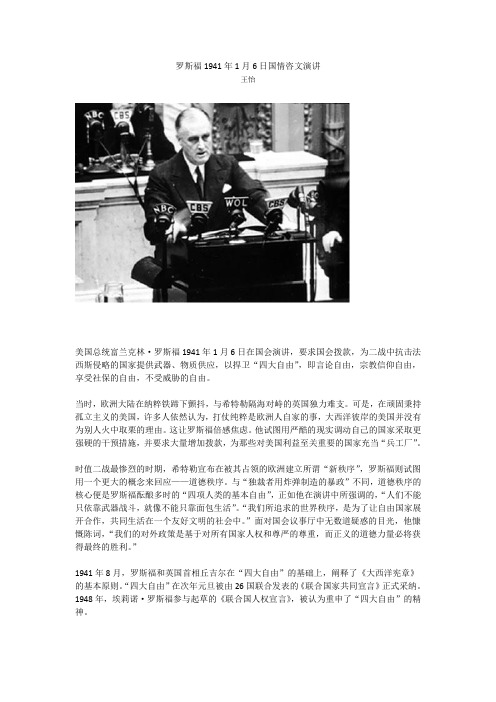
罗斯福1941年1月6日国情咨文演讲王怡美国总统富兰克林·罗斯福1941年1月6日在国会演讲,要求国会拨款,为二战中抗击法西斯侵略的国家提供武器、物质供应,以捍卫“四大自由”,即言论自由,宗教信仰自由,享受社保的自由,不受威胁的自由。
当时,欧洲大陆在纳粹铁蹄下颤抖,与希特勒隔海对峙的英国独力难支。
可是,在顽固秉持孤立主义的美国,许多人依然认为,打仗纯粹是欧洲人自家的事,大西洋彼岸的美国并没有为别人火中取栗的理由。
这让罗斯福倍感焦虑。
他试图用严酷的现实调动自己的国家采取更强硬的干预措施,并要求大量增加拨款,为那些对美国利益至关重要的国家充当“兵工厂”。
时值二战最惨烈的时期,希特勒宣布在被其占领的欧洲建立所谓“新秩序”,罗斯福则试图用一个更大的概念来回应——道德秩序。
与“独裁者用炸弹制造的暴政”不同,道德秩序的核心便是罗斯福酝酿多时的“四项人类的基本自由”,正如他在演讲中所强调的,“人们不能只依靠武器战斗,就像不能只靠面包生活”。
“我们所追求的世界秩序,是为了让自由国家展开合作,共同生活在一个友好文明的社会中。
”面对国会议事厅中无数道疑惑的目光,他慷慨陈词,“我们的对外政策是基于对所有国家人权和尊严的尊重,而正义的道德力量必将获得最终的胜利。
”1941年8月,罗斯福和英国首相丘吉尔在“四大自由”的基础上,阐释了《大西洋宪章》的基本原则。
“四大自由”在次年元旦被由26国联合发表的《联合国家共同宣言》正式采纳。
1948年,埃莉诺·罗斯福参与起草的《联合国人权宣言》,被认为重申了“四大自由”的精神。
现代史上,很少有哪些政治概念比美国前总统罗斯福首倡的“四大自由”产生过更深广的影响,并在此后的3/4个世纪中,激励着全世界的无数人为之奋斗不息。
在许多历史和政治学家看来,富兰克林·罗斯福在二战时首倡的“四大自由”,是文明社会的基础。
谈到罗斯福的历史贡献,许多人主张,他提出的四大自由“标志着新时代的开端”;也有不少人相信,将“四大自由”真正落到实处,始终是美国乃至整个世界面临的挑战。
美国总统奥巴马2015年1月21日国情咨文全文(附中文翻译)
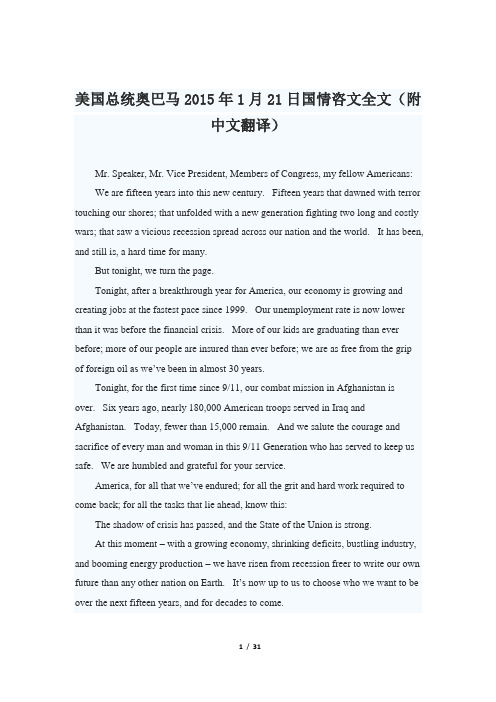
美国总统奥巴马2015年1月21日国情咨文全文(附中文翻译)Mr. Speaker, Mr. Vice President, Members of Congress, my fellow Americans: We are fifteen years into this new century. Fifteen years that dawned with terror touching our shores; that unfolded with a new generation fighting two long and costly wars; that saw a vicious recession spread across our nation and the world. It has been, and still is, a hard time for many.But tonight, we turn the page.Tonight, after a breakthrough year for America, our economy is growing and creating jobs at the fastest pace since 1999. Our unemployment rate is now lower than it was before the financial crisis. More of our kids are graduating than ever before; more of our people are insured than ever before; we are as free from the gripof foreig n oil as we’ve been in almost 30 years.Tonight, for the first time since 9/11, our combat mission in Afghanistan is over. Six years ago, nearly 180,000 American troops served in Iraq and Afghanistan. Today, fewer than 15,000 remain. And we salute the courage and sacrifice of every man and woman in this 9/11 Generation who has served to keep us safe. We are humbled and grateful for your service.America, for all that we’ve endured; for all the grit and hard work required to come back; for all the tasks that lie ahead, know this:The shadow of crisis has passed, and the State of the Union is strong.At this moment – with a growing economy, shrinking deficits, bustling industry, and booming energy production – we have risen from recession freer to write our own future than any other nation on Earth. It’s now up to us to choose who we want to be over the next fifteen years, and for decades to come.Will we accept an economy where only a few of us do spectacularly well? Or will we commit ourselves to an economy that generates rising incomes and chances for everyone who makes the effort?Will we approach the world fearful and reactive, dragged into costly conflicts that strain our military and set back our standing? Or will we lead wisely, using all elements of our power to defeat new threats and protect our planet?Will we allow ourselves to be sorted into factions and turned against one another – or will we recapture the sense of common purpose that has always propelled America forward?In two weeks, I will send this Congress a budget filled with ideas that are practical, not partisan. And in the months ahead, I’ll crisscross the country making a case for those ideas.So tonight, I want to focus less on a checklist of proposals, and focus more on the values at stake in the choices before us.It begins with our economy.Seven years ago, Rebekah and Ben Erler of Minneapolis were newlyweds. She waited tables. He worked construction. Their first child, Jack, was on the way.They were young and in love in Ame rica, and it doesn’t get much better than that.“If only we had known,” Rebekah wrote to me last spring, “what was about to happen to the housing and construction market.”As the crisis worsened, Ben’s business dried up, so he took what jobs he could find, even if they kept him on the road for long stretches of time. Rebekah took out student loans, enrolled in community college, and retrained for a new career. They sacrificed for each other. And slowly, it paid off. They bought their firsthome. They had a second son, Henry. Rebekah got a better job, and then a raise. Ben is back in construction – and home for dinner every night.“It is amazing,” Rebekah wrote, “what you can bounce back from when you have to…we are a strong, tight-knit family who has made it through some very, very hard times.”We are a strong, tight-knit family who has made it through some very, very hard times.America, Rebekah and Ben’s story is our story.They represent the millions who have worked hard, and scrimped, and sacrificed, and retooled. You are the reason I ran for this office. You’re the people I was thinking of six years ago today, in the darkest months of the crisis, when I stood on the steps of this Capitol and promised we would rebuild our economy on a new foundation. And it’s been your effort and resilience that has made it possible for our country to emerge stronger.We believed we could reverse the tide of outsourcing, and draw new jobs to our shores. And over the past five years, our businesses have created more than 11 million new jobs.We believed we could reduce our dependence on foreign oil and protect our planet. And today, America is number one in oil and gas. America is number one in wind power. Every three weeks, we bring online as much solar power as we did in all of 2008. And thanks to lower gas prices and higher fuel standards, the typical family this year should save $750 at the pump.We believed we could prepare our kids for a more competitive world. And today, our younger students have earned the highest math and reading scores on record. Our high school graduation rate has hit an all-time high. And more Americans finish college than ever before.We believed that sensible regulations could prevent another crisis, shield families from ruin, and encourage fair competition. Today, we have new tools to stop taxpayer-funded bailouts, and a new consumer watchdog to protect us from predatory lending and abusive credit card practices. And in the past year alone, about ten million uninsured Americans finally gained the security of health coverage.At every step, we were told our goals were misguided or too ambitious; that we would crush jobs and explode deficits. Instead, we’ve seen the fastest economic growth in over a decade, our deficits cut by two-thirds, a stock market that has doubled, and health care inflation at its lowest rate in fifty years.So the verdict is clear. Middle-class economics works. Expanding opportunity works. And these policies will continue to work, as long as politics do n’t get in the way. We can’t slow down businesses or put our economy at risk with government shutdowns or fiscal showdowns. We can’t put the security of families at risk by taking away their health insurance, or unraveling the new rules on Wall Street, or refighting past battles on immigration when we’ve got a system to fix.And if a bill comes to my desk that tries to do any of these things, it will earn my veto.Today, thanks to a growing economy, the recovery is touching more and more lives. Wages are finally starting to rise again. We know that more small business owners plan to raise their employees’ pay than at any time since 2007.But here’s the thing – those of us here tonight, we need to set our sights higher than just making sure government d oesn’t halt the progress we’re making.We need to do more than just do no harm. Tonight, together, let’s do more to restore the link between hard work and growing opportunity for every American.Because families like Rebekah’s still need our help.She and Ben are working as hard as ever, but have to forego vacations and a new car so they can pay off student loans and save for retirement. Basic childcare for Jack and Henry costs more than their mortgage, and almost as much as a year at the University of Minnesota. Like millions of hardworking Americans, Rebekah isn’t asking for a handout, but she is asking that we look for more ways to help families get ahead.In fact, at every moment of economic change throughout our history, this country has taken bold action to adapt to new circumstances, and to make sure everyone gets a fair shot. We set up worker protections, Social Security, Medicare, and Medicaid to protect ourselves from the harshest adversity. We gave our citizens schools and colleges, infrastructure and the internet – tools they needed to go as far as their effort will take them.That’s what middle-class economics is – the idea that this country does best when everyone gets their fair shot, everyone does their fair share, and everyone plays by the same set of rules. We don’t just want everyone to share in America’s success – we want everyone to contribute to our success.So what does middle-class economics require in our time?First – middle-class economics means helping working families feel more secure in a world of constant change. That means helping folks afford childcare, college, health care, a home, retirement – and my budget will address each of these issues, lowering the taxes of working families and putting thousands of dollars back into their pockets each year.Here’s one example.During World War II, when men like my grandfather went off to war, having women like my grandmother in the workforce was a national security priority – so this country provided universal childcare. In toda y’s economy, when having both parents in the workforce is an economic necessity for many families, we need affordable, high-quality childcare more than ever. It’s not anice-to-have –it’s a must-have. It’s time we stop treating childcare as a side issue, or a women’s issue, and treat it like the national economic priority that it is for all of us. And that’s why my plan will make quality childcare more available, and more affordable, for every middle-class and low-income family with young children in America – by creating more slots and a new tax cut of up to $3,000 per child, per year.Here’s another example.Today, we’re the only advanced country on Earth that doesn’t guarantee paid sick leave or paid maternity leave to our workers.Forty-three million workers have no paid sick leave. Forty-three million. Think aboutthat. And that forces too many parents to make the gut-wrenching choice between a paycheck and a sick kid at home. So I’ll be taking new action to help states adopt paid leave laws of their own. And since paid sick leave won where it was on the ballot last November, let’s put it to a vote right here in Washington.Send me a bill that gives every worker in America the opportunity to earn seven days of paid sick leave. It’s the right thing to do.Of course, nothing helps families make ends meet like higher wages. That’s why this Congress still needs to pass a law that makes sure a woman is paid the same as a man for doing the same work. Really. It’s 2015.It’s time.We still need to make sure employees get the overtime they’ve earned.And to everyone in thisCongress who still refuses to raise the minimum wage, I say this: If you truly believe you could work full-time and support a family on less than $15,000 a year, go tryit. If not, vote to give millions of the hardest-working people in America a raise.These ideas won’t make everybody rich, or relieve every hardship.That’s not the job of government. To give working families a fair shot, we’ll still need more employers to s ee beyond next quarter’s earnings and recognize that investing in their workforce is in their company’s long-term interest. We still need laws that strengthen rather than weaken unions, and give American workers a voice. But things like child care and sick leave and equal pay; things like lower mortgage premiums and a higher minimum wage – these ideas will make a meaningful difference in the lives of millions of families. That is a fact. And that’s what all of us – Republicans and Democrats alike – were sent here to do.Second, to make sure folks keep earning higher wages down the road, we have to do more to help Americans upgrade their skills.America thrived in the 20th century because we made high school free, sent a generation of GIs to college, and trained the best workforce in the world. But in a 21st century economy that rewards knowledge like never before, we need to do more.By the end of this decade, two in three job openings will require some higher education. Two in three. And yet, we still live in a country where too many bright, striving Americans are priced out of the education they need. It’s not fair to them, and it’s not smart for our future.That’s why I am sending this Congress a bold new plan to lower the cost of community college – to zero.Forty percent of our college students choose community college. Some are young and starting out. Some are older and looking for a better job. Some are veterans and single parents trying to transition back into the job market. Whoever you are, this plan is your chance to graduate ready for the new economy, without a load of debt. Understand, you’ve got to earn it –you’ve got to keep your grades up and graduate on time. Tennessee, a state with Republican leadership, and Chicago, a city with Democratic leadership, are showing that free community college ispossible. I want to spread that idea all across America, so that two years of college becomes as free and universal in America as high school is today. And I want to work with this Congress, to make sure Americans already burdened with student loans can reduce their monthly payments, so that student debt doesn’t derail anyone’s dreams.Thanks to Vice President Biden’s great work to update our job training system, we’re connecting community colleges with local employers to train workers to fill high-paying jobs like coding, and nursing, and robotics. Tonight, I’m also asking more businesses to follow the lead of companies like CVS and UPS, and offer more educational benefits and paid apprenticeships – opportunities that give workers the chance to earn higher-paying jobs even if they don’t have a higher education.And as a new generation of veterans comes home, we owe them every opportunity to live the American Dream they helped defend. Alrea dy, we’ve made strides towards ensuring that every veteran has access to the highest qualitycare. We’re slashing the backlog that had too many veterans waiting years to get the benefits they need, and we’re making it easier for vets to translate their tr aining and experience into civilian jobs. Joining Forces, the national campaign launched by Michelle and Jill Biden, has helped nearly 700,000 veterans and military spouses get new jobs. So to every CEO in America, let me repeat: If you want somebody wh o’s going to get the job done, hire a veteran.Finally, as we better train our workers, we need the new economy to keep churning out high-wage jobs for our workers to fill.Since 2010, America has put more people back to work than Europe, Japan, and all advanced economies combined. Our manufacturers have added almost 800,000 new jobs. Some of our bedrock sectors, like our auto industry, are booming. But there are also millions of Americans who work in jobs that didn’t even exist ten or twenty years ago – jobs at companies like Google, and eBay, and Tesla.So no one knows for certain which industries will generate the jobs of the future. But we do know we want them here in America. That’s why the third part ofmiddle-class economics is about building the most competitive economy anywhere, the place where businesses want to locate and hire.21st century businesses need 21st century infrastructure – modern ports, stronger bridges, faster trains and the fastest internet. Democrats and Republicans used to agree on this. So let’s set our sights higher than a single oil pipeline.Let’s pass a bipartisan infrastructure plan that could create more than thirty times as many jobs per year, and make this country stronger for decades to come.21st century businesses, including small businesses, need to sell more American products overseas. Today, our businesses export more than ever, and exporters tend to pay their workers higher wages. But as we speak, China wants to write the rules for the world’s faste st-growing region. That would put our workers and businesses at a disadvantage. Why would we let that happen? We should write those rules. We should level the playing field. That’s why I’m asking both parties to give me trade promotion authority to protect American workers, with strong new trade deals from Asia to Europe that aren’t just free, but fair.Look, I’m the first one to admit that past trade deals haven’t always lived up to the hype, and that’s why we’ve gone after countries that break the ru les at our expense. But ninety-five percent of the world’s customers live outside our borders, and we can’t close ourselves off from those opportunities.More than half of manufacturing executives have said they’re actively looking at bringing jobs back from China. Let’s give them one more reason to get it done.21st century businesses will rely on American science, technology, research and development. I want the country that eliminated polio and mapped the human genome to lead a new era of medicine – one that delivers the right treatment at the right time. In some patients with cystic fibrosis, this approach has reversed a disease once thought unstoppable. Tonight, I’m launching a new Precision Medicine Initiative to bring us closer to curing diseases like cancer and diabetes – and to give all of us access to the personalized information we need to keep ourselves and our families healthier.I intend to protect a free and open internet, extend its reach to every classroom, and every community, and help folks build the fastest networks, so that the next generation of digital innovators and entrepreneurs have the platform to keep reshaping our world.I want Americans to win the race for the kinds of discoveries that unleash new jobs – converting sunlight into liquid fuel; creating revolutionary prosthetics, so that a veteran who gave his arms for his country can play catch with his kid; pushing out into the Solar System not just to visit, but to stay. Last month, we launched a new spacecraft as part of a re-energized space program that will send American astronauts to Mars. In two months, to prepare us for those missions, Scott Kelly will begin a year-long stay in space. Good luck, Captain – and make sure to Instagram it.Now, the truth is, when it comes to issues like infrastructure and basic research, I know there’s bipartisan support in this chamber.Members of both parties have told me so. Where we too often run onto the rocks is how to pay for these investments. As Americans, we don’t mind paying our fair share of taxes, as long as everybody else does, too. But for far too long, lobbyists have rigged the tax code with loopholes that let some corporations pay nothing while others pay fullfreight. They’ve riddled it with giveaways the superrich don’t need, denying a break to middle class families who do.This year, we have an opportunity to change that. Let’s close loopholes so we stop rewarding companies that keep profits abroad, and reward those that invest in America. Let’s use those savings to rebuild our infrastructure and make it more attractive for companies to bring jobs home. Let’s simplify the system and let a small business owner file based on her actual bank statement, instead of the number of accountants she can afford. And let’s c lose the loopholes that lead to inequality by allowing the top one percent to avoid paying taxes on their accumulated wealth. We can use that money to help more families pay for childcare and send their kids to college. We need a tax code that truly helps working Americans trying to get a leg up in the new economy, and we can achieve that together.Helping hardworking families make ends meet. Giving them the tools they need for good-paying jobs in this new economy. Maintaining the conditions for growth and competitiveness. This is where America needs to go. I believe it’s where the American people want to go. It will make our economy stronger a year from now, fifteen years from now, and deep into the century ahead.Of course, if there’s one thing this new century has taught us, it’s that we cannot separate our work at home from challenges beyond our shores.My first duty as Commander-in-Chief is to defend the United States of America. In doing so, the question is not whether America leads in the world, but how. When we make rash decisions, reacting to the headlines instead of using our heads; when the first response to a challenge is to send in our military – then we risk getting drawn into unnecessary conflicts, and neglect the broader strategy we need for a safer, more prosperous world. That’s what our enemies want us to do.I believe in a smarter kind of American leadership. We lead best when we combine military power with strong diplomacy; when we leverage our power with coalition building; when w e don’t let our fears blind us to the opportunities that this new century presents. That’s exactly what we’re doing right now – and around the globe, it is making a difference.First, we stand united with people around the world who’ve been targeted by terrorists – from a school in Pakistan to the streets of Paris. We will continue to hunt down terrorists and dismantle their networks, and we reserve the right to act unilaterally, as we’ve done relentlessly since I took office to take out terrorists who pose a direct threat to us and our allies.At the same time, we’ve learned some costly lessons over the last thirteen years.Instead of Americans patrolling the valleys of Afghanistan, we’ve trained their security forces, who’ve now taken the lead, and we’ve honored our troops’ sacrifice by supporting that country’s first democratic transition.Instead of sending large ground forces overseas, we’re partnering with nations from South Asia to North Africa to deny safe haven to terrorists who threaten America. In Iraq and Syria, American leadership – including our military power –is stopping ISIL’sadvance. Instead of getting dragged into another ground war in the Middle East, we are leading a broad coalition, including Arab nations, to degrade and ultimately destroy this terrorist group. We’re also supporting a moderate opposition in Syria that can help us in this effort, and assisting people everywhere who stand up to the bankrupt ideology of violent extremism. This effort will take time. It will require focus. But we will succeed. And tonight, I call on this Congress to show the world that we are united in this mission by passing a resolution to authorize the use of force against ISIL.Second, we are demonstrating the power of American strength and diplomacy. We’re upholding the principle that bigger nations can’t bully the small –by opposing Russian aggression, supporting Ukraine’s democracy, and reassuring our NATO allies. Last year, as we were doing the hard work of imposing sanctions along with o ur allies, some suggested that Mr. Putin’s aggression was a masterful display of strategy and strength. Well, today, it is America that stands strong and united with our allies, while Russia is isolated, with its economy in tatters.That’s how America lea ds – not with bluster, but with persistent, steady resolve.In Cuba, we are ending a policy that was long past its expiration date. When what you’re doing doesn’t work for fifty years, it’s time to try something new.Our shift in Cuba policy has the potential to end a legacy of mistrust in our hemisphere; removes a phony excuse for restrictions in Cuba; stands up for democratic values; and extends the hand of friendship to the Cuban people. And this year, Congress should begin the work of ending the embargo. As His Holiness, Pope Francis, has said, diplomacy is the work of “small steps.”These small steps have added up to new hope for the future in Cuba. And after years in prison, we’re overjoyed that Alan Gross is back where he belongs. Welcome home, Alan.Our diplomacy is at work with respect to Iran, where, for the first time in a decade, we’ve halted the progress of its nuclear program and reduced its stockpile of nuclear material. Between now and this spring, we have a chance to negotiate a comprehensive agreement that prevents a nuclear-armed Iran; secures America and our allies – including Israel; while avoiding yet another Middle East conflict. Thereare no guarantees that negotiations will succeed, and I keep all options on the table to prevent a nuclear Iran. But new sanctions passed by this Congress, at this moment in time, will all but guarantee that diplomacy fails – alienating America from its allies; and ensuring that Iran starts up its nuclear program again. It doesn’t makesense. That is why I will veto any new sanctions bill that threatens to undo this progress. The American people expect us to only go to war as a last resort, and I intend to stay true to that wisdom.Third, we’re looking beyond the issues that have consumed us in the past to shape the coming century.No foreign nation, no hacker, should be able to shut down our networks, steal our trade secrets, or invade the privacy of American families, especially ourkids. We are making sure our government integrates intelligence to combat cyber threats, just as we have done to combat terrorism. And tonight, I urge this Congress to finally pass the legislation we need to better meet the evolving threat ofcyber-attacks, combat identity theft, and protect our children’s informat ion. If we don’t act, we’ll leave our nation and our economy vulnerable.If we do, we can continue to protect the technologies that have unleashed untold opportunities for people around the globe.In West Africa, our troops, our scientists, our doctors, our nurses and healthcare workers are rolling back Ebola – saving countless lives and stopping the spread of disease. I couldn’t be prouder of them, and I thank this Congress for your bipartisan support of their efforts. But the job is not yet done – and the world needs to use this lesson to build a more effective global effort to prevent the spread of future pandemics, invest in smart development, and eradicate extreme poverty.In the Asia Pacific, we are modernizing alliances while making sure that other nations play by the rules – in how they trade, how they resolve maritime disputes, and how they participate in meeting common international challenges like nonproliferation and disaster relief. And no challenge – no challenge – poses a greater threat to future generations than climate change.2014 was the planet’s warmest year on record.Now, one year doesn’t make a trend, but this does – 14 of the 15 warmest years on record have all fallen in the first 15 years of this century.I’ve heard some folks try to dodge the evidence by saying they’re not scientists; that we don’t have enough information to act.Well, I’m not a scientist, either.But you know what – I know a lot of really good scientists at NASA, and NOAA, and at our major universities. The best scientists in the world are all telling us that our activities are changing the climate, and if we do not act forcefully, we’ll continue to see rising oceans, longer, hotter heat waves, dangerous droughts and floods, and massive disruptions that can trigger greater migration, conflict, and hunger around the globe. The Pentagon says that climate change poses immediate risks to our national security. We should act like it.That’s why, over the past six years, we’ve done more than ever before to combat climate change, from the way we produce energy, to the way we use it. That’s why we’ve set aside more public lands and waters than any administration in history.And that’s why I will not let this Congress endanger the health of our children by turning back the clock on our efforts. I am determined to make sure American leadership drives international action. In Beijing, we made an historic announcement – the United States will double the pace at which we cut carbon pollution, and China committed, for the first time, to limiting their emissions. And because the world’s two largest economies came together, other nations are now stepping up, and offering hope that, this year, the world will finally reach an agreement to protect the one planet we’ve got.Th ere’s one last pillar to our leadership –and that’s the example of our values.As Americans, we respect human dignity, even when we’re threatened, which is why I’ve prohibited torture, and worked to make sure our use of new technology like drones is properly constrained. It’s why we speak out against the deplorableanti-Semitism that has resurfaced in certain parts of the world. It’s why we continue to reject offensive stereotypes of Muslims – the vast majority of whom share our commitment to peace. That’s why we defend free speech, and advocate for political。
美国早期的外交思想

美国早期的外交思想美国在历史上是一个后起的西方资本主义大国。
独立战争(1775-1783)胜利后,美国资本主义发展迅速,到1860年,美国的工业总产值已居世界第4位。
经过1861-1863年的南北战争,北方的资本主义制度战胜了南方的奴隶制度,美国的独立和统一从此得到了有力的保障。
从18世纪末到19世纪中期,美国的外交通常带有孤立主义的特点,这种孤立主义主要表现为对欧洲事务持中立态度。
与此同时,美国在美洲大陆却奉行扩张主义政策。
诸如1803年,美国利用法国的困难处境,从法国手中取得了路易斯安娜;1810-1818年,美国从西班牙手中夺取了佛罗里达等等。
1823年,美国总统门罗在年度国情咨文中还提出了《门罗宣言》,即主张美洲是美洲人的欧洲,欧洲列强不得干预美洲独立国家的事务。
《门罗宣言》的发表,虽然对于维护拉丁美洲新独立国家的独立具有一定的进步意义,但是,它也表露了美国企图独占拉丁美洲,把拉丁美洲变成其势力范围的野心。
第一节:富兰克林的外交思想本杰明·富兰克林(Benjamin Franklin1706-1790),美国资产阶级民主主义者,杰出的政治家,著名的科学家。
富兰克林的一生是充满坎坷,不断奋斗与超越的一生。
他对美国的独立战争和科学事业都作出过重要贡献。
富兰克林于1706年1月17日生于今麻萨渚州波士顿城一个贫穷的家庭,因家境贫穷,他并未受正规教育。
10岁那年被迫中止学业。
但勤奋好学的他并未因离开学校而停止学习,在帮父亲工作的两年里,他阅读了《为善论》、《希腊罗马名人传》等大量作品。
这些作品对富兰克林的思想起了重要启蒙作用。
1717年,富兰克林做了同母异父兄弟詹姆士、富兰克林的学徒。
1723年因争执而分手。
1724年,富兰克林孤身来到伦敦,其间他在一家印刷所里工作了近一年。
在英国期间他写了一本小册子对当时的社会现象发表了见解,他提出:勤劳的人不得不把自己的劳动所得分给寄生、懒散的人,这是造成社会贫困的主要原因。
拜登的国情咨文
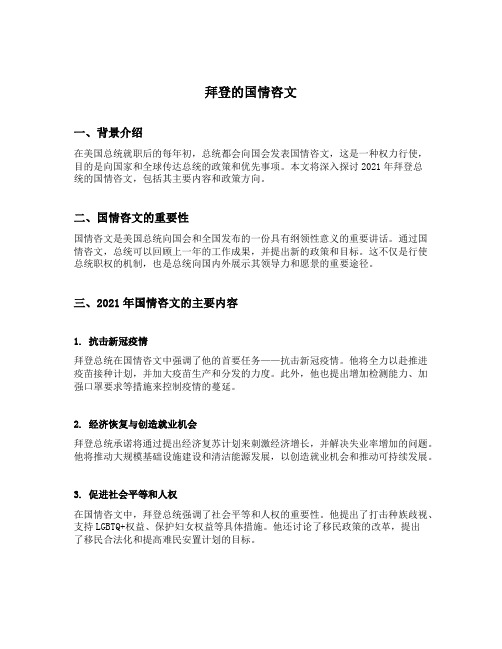
拜登的国情咨文一、背景介绍在美国总统就职后的每年初,总统都会向国会发表国情咨文,这是一种权力行使,目的是向国家和全球传达总统的政策和优先事项。
本文将深入探讨2021年拜登总统的国情咨文,包括其主要内容和政策方向。
二、国情咨文的重要性国情咨文是美国总统向国会和全国发布的一份具有纲领性意义的重要讲话。
通过国情咨文,总统可以回顾上一年的工作成果,并提出新的政策和目标。
这不仅是行使总统职权的机制,也是总统向国内外展示其领导力和愿景的重要途径。
三、2021年国情咨文的主要内容1. 抗击新冠疫情拜登总统在国情咨文中强调了他的首要任务——抗击新冠疫情。
他将全力以赴推进疫苗接种计划,并加大疫苗生产和分发的力度。
此外,他也提出增加检测能力、加强口罩要求等措施来控制疫情的蔓延。
2. 经济恢复与创造就业机会拜登总统承诺将通过提出经济复苏计划来刺激经济增长,并解决失业率增加的问题。
他将推动大规模基础设施建设和清洁能源发展,以创造就业机会和推动可持续发展。
3. 促进社会平等和人权在国情咨文中,拜登总统强调了社会平等和人权的重要性。
他提出了打击种族歧视、支持LGBTQ+权益、保护妇女权益等具体措施。
他还讨论了移民政策的改革,提出了移民合法化和提高难民安置计划的目标。
4. 气候变化和环境保护拜登总统将气候变化和环境保护作为其关注的重点之一。
他提出了重新加入《巴黎协定》的计划,并制定了全面的清洁能源和减排目标。
他还计划对工业部门进行升级和技术创新,以降低碳排放。
四、国情咨文的政策影响1. 国内政策国情咨文中的政策内容将直接影响美国国内的各个领域。
例如,经济恢复计划将为就业市场提供更多机会,改善社会经济状况。
同时,关注社会平等和人权的政策将有助于消除社会不平等,并促进社会进步。
2. 国际政策国情咨文也对美国的国际关系和外交政策产生重大影响。
特别是拜登总统提出重新加入《巴黎协定》,表明美国将重新承担领导全球应对气候变化的责任。
这将使美国在国际舞台上的地位得到提升,并与其他国家加强合作。
2013 the state of the union(美国总统奥巴马2013年国情咨文)

RESIDENT BARACK OBAMA'S 2013 STA TE OF THE UNION ADDRESS THE PRESIDENT: Mr. Speaker, Mr. Vice President, members of Congress, fellow citizens: Fifty-one years ago, John F Kennedy declared to this chamber that “the Constitution makes us not rivals for power but partners for progress.”“It is my task,”he said, “to report the State of the Union -- to improve it is the task of us all.”Tonight, thanks to the grit and determination of the American people, there is much progress to report. After a decade of grinding war, our brave men and women in uniform are coming home. After years of grueling recession, our businesses have created over six million new jobs. We buy more American cars than we have in five years, and less foreign oil than we have in 20. Our housing market is healing, our stock market is rebounding, and consumers, patients, and homeowners enjoy stronger protections than ever before.So, together, we have cleared away the rubble of crisis, and we can say with renewed confidence that the State of our Union is stronger.But we gather here knowing that there are millions of Americans whose hard work and dedication have not yet been rewarded. Our economy is adding jobs -- but too many people still can’t find full-time employment. Corporate profits have skyrocketed to all-time highs -- but for more than a decade, wages and incomes have barely budged.It is our generation’s task, then, to reignite the true engine of America’s economic growth -- a rising, thriving middle class.It is our unfinished task to restore the basic bargain that built this country -- the idea that if you work hard and meet your responsibilities, you can get ahead, no matter where you come from, no matter what you look like, or who you love.It is our unfinished task to make sure that this government works on behalf of the many, and not just the few; that it encourages free enterprise, rewards individual initiative, and opens the doors of opportunity to every child across this great nation.The American people don’t expect government to solve every problem. They don’t expect those of us in this chamber to agree on every issue. But they do expect us to put the nation’s interests before party. They do expect us to forge reasonable compromise where we can. For they know that America moves forward only when we do so together, and that the responsibility of improving this union remains the task of us all.Our work must begin by making some basic decisions about our budget -- decisions that will have a huge impact on the strength of our recovery.Over the last few years, both parties have worked together to reduce the deficit by more than $2.5 trillion -- mostly through spending cuts, but also by raising tax rates on the wealthiest 1 percent of Americans. As a result, we are more than halfway towards the goal of $4 trillion in deficit reduction that economists say we need to stabilize our finances.Now we need to finish the job. And the question is, how?In 2011, Congress passed a law saying that if both parties couldn’t agree on a plan to reach our deficit goal, about a trillion dollars’worth of budget cuts would automatically go into effect this year. These sudden, harsh, arbitrary cuts would jeopardize our military readiness. They’d devastate priorities like education, and energy, and medical research. They would certainly slow our recovery, and cost us hundreds of thousands of jobs. That’s why Democrats, Republicans, business leaders, and economists have already said that these cuts, known here in Washington as the sequester, are a really bad idea.Now, some in Congress have proposed preventing only the defense cuts by making even bigger cuts to things like education and job training, Medicare and Social Security benefits. That idea is even worse.Yes, the biggest driver of our long-term debt is the rising cost of health care for an aging population. And those of us who care deeply about programs like Medicare must embrace the need for modest reforms -- otherwise, our retirement programs will crowd out the investments we need for our children, and jeopardize the promise of a secure retirement for future generations.But we can’t ask senior citizens and working families to shoulder the entire burden of deficit reduction while asking nothing more from the wealthiest and the most powerful. We won’t grow the middle class simply by shifting the cost of health care or college onto families that are already struggling, or by forcing communities to lay off more teachers and more cops and more firefighters. Most Americans -- Democrats, Republicans, and independents -- understand that we can’t just cut our way to prosperity. They know that broad-based economic growth requires a balanced approach to deficit reduction, with spending cuts and revenue, and with everybody doing their fair share. And that’s the approach I offer tonight.On Medicare, I’m prepared to enact reforms that will achieve the same amount of health care savings by the beginning of the next decade as the reforms proposed by the bipartisan Simpson-Bowles commission.Already, the Affordable Care Act is helping to slow the growth of health care costs. And the reforms I’m proposing go even further. We’ll reduce taxpayer subsidies to prescription drug companies and ask more from the wealthiest seniors. We’ll bring down costs by changing the way our government pays for Medicare, because our medical bills shouldn’t be based on the number of tests ordered or days spent in the hospital; they should be based on the quality of care that our seniors receive. And I am open to additional reforms from both parties, so long as they don’t violate the guarantee of a secure retirement. Our government shouldn’t make promises we cannot keep -- but we must keep the promises we’ve already made.To hit the rest of our deficit reduction target, we should do what leaders in both parties have already suggested, and save hundreds of billions of dollars by getting rid of tax loopholes and deductions for the well-off and the well-connected. After all, why would we choose to make deeper cuts to education and Medicare just to protect special interest tax breaks? How is that fair? Why is it that deficit reduction is a big emergency justifying making cuts in Social Security benefits but not closing some loopholes? How does that promote growth?Now is our best chance for bipartisan, comprehensive tax reform that encourages job creation and helps bring down the deficit. We can get this done. The American people deserve a tax code that helps small businesses spend less time filling out complicated forms, and more time expanding and hiring -- a tax code that ensures billionaires with high-powered accountants can’t work the system and pay a lower rate than their hardworking secretaries; a tax code that lowers incentives to move jobs overseas, and lowers tax rates for businesses and manufacturers that are creating jobs right here in the United States of America. That’s what tax reform can deliver. That’s what we can do together.I realize that tax reform and entitlement reform will not be easy. The politics will be hard for both sides. None of us will get 100 percent of what we want. But the alternative will cost us jobs, hurt our economy, visit hardship on millions of hardworking Americans. So let’s set partyinterests aside and work to pass a budget that replaces reckless cuts with smart savings and wise investments in our future. And let’s do it without the brinksmanship that stresses consumers and scares off investors. The greatest nation on Earth cannot keep conducting its business by drifting from one manufactured crisis to the next. We can't do it.Let’s agree right here, right now to keep the people’s government open, and pay our bills on time, and always uphold the full faith and credit of the United States of America. The American people have worked too hard, for too long, rebuilding from one crisis to see their elected officials cause another.Now, most of us agree that a plan to reduce the deficit must be part of our agenda. But let’s be clear, deficit reduction alone is not an economic plan. A growing economy that creates good, middle-class jobs -- that must be the North Star that guides our efforts. Every day, we should ask ourselves three questions as a nation: How do we attract more jobs to our shores? How do we equip our people with the skills they need to get those jobs? And how do we make sure that hard work leads to a decent living?A year and a half ago, I put forward an American Jobs Act that independent economists said would create more than 1 million new jobs. And I thank the last Congress for passing some of that agenda. I urge this Congress to pass the rest. But tonight, I’ll lay out additional proposals that are fully paid for and fully consistent with the budget framework both parties agreed to just 18 months ago. Let me repeat -- nothing I’m proposing tonight should increase our deficit by a single dime. It is not a bigger government we need, but a smarter government that sets priorities and invests in broad-based growth. That's what we should be looking for.Our first priority is making America a magnet for new jobs and manufacturing. After shedding jobs for more than 10 years, our manufacturers have added about 500,000 jobs over the past three. Caterpillar is bringing jobs back from Japan. Ford is bringing jobs back from Mexico. And this year, Apple will start making Macs in America again.There are things we can do, right now, to accelerate this trend. Last year, we created our first manufacturing innovation institute in Youngstown, Ohio. A once-shuttered warehouse is now a state-of-the art lab where new workers are mastering the 3D printing that has the potential to revolutionize the way we make almost everything. There’s no reason this can’t happen in other towns.So tonight, I’m announcing the launch of three more of these manufacturing hubs, where businesses will partner with the Department of Defense and Energy to turn regions left behind by globalization into global centers of high-tech jobs. And I ask this Congress to help create a network of 15 of these hubs and guarantee that the next revolution in manufacturing is made right here in America. We can get that done.Now, if we want to make the best products, we also have to invest in the best ideas. Every dollar we invested to map the human genome returned $140 to our economy -- every dollar. Today, our scientists are mapping the human brain to unlock the answers to Alzheimer’s. They’re developing drugs to regenerate damaged organs; devising new material to make batteries 10 times more powerful. Now is not the time to gut these job-creating investments in science and innovation. Now is the time to reach a level of research and development not seen since the height of the Space Race. We need to make those investments.Today, no area holds more promise than our investments in American energy. After years of talking about it, we’re finally poised to control our own energy future. We produce more oil athome than we have in 15 years. We have doubled the distance our cars will go on a gallon of gas, and the amount of renewable energy we generate from sources like wind and solar -- with tens of thousands of good American jobs to show for it. We produce more natural gas than ever before -- and nearly everyone’s energy bill is lower because of it. And over the last four years, our emissions of the dangerous carbon pollution that threatens our planet have actually fallen.But for the sake of our children and our future, we must do more to combat climate change. Now, it’s true that no single event makes a trend. But the fact is the 12 hottest years on record have all come in the last 15. Heat waves, droughts, wildfires, floods -- all are now more frequent and more intense. We can choose to believe that Superstorm Sandy, and the most severe drought in decades, and the worst wildfires some states have ever seen were all just a freak coincidence. Or we can choose to believe in the overwhelming judgment of science -- and act before it’s too late.Now, the good news is we can make meaningful progress on this issue while driving strong economic growth. I urge this Congress to get together, pursue a bipartisan, market-based solution to climate change, like the one John McCain and Joe Lieberman worked on together a few years ago. But if Congress won’t act soon to protect future generations, I will. I will direct my Cabinet to come up with executive actions we can take, now and in the future, to reduce pollution, prepare our communities for the consequences of climate change, and speed the transition to more sustainable sources of energy.Four years ago, other countries dominated the clean energy market and the jobs that came with it. And we’ve begun to change that. Last year, wind energy added nearly half of all new power capacity in America. So let’s generate even more. Solar energy gets cheaper by the year -- let’s drive down costs even further. As long as countries like China keep going all in on clean energy, so must we.Now, in the meantime, the natural gas boom has led to cleaner power and greater energy independence. We need to encourage that. And that’s why my administration will keep cutting red tape and speeding up new oil and gas permits. That’s got to be part of an all-of-the-above plan. But I also want to work with this Congress to encourage the research and technology that helps natural gas burn even cleaner and protects our air and our water.In fact, much of our new-found energy is drawn from lands and waters that we, the public, own together. So tonight, I propose we use some of our oil and gas revenues to fund an Energy Security Trust that will drive new research and technology to shift our cars and trucks off oil for good. If a nonpartisan coalition of CEOs and retired generals and admirals can get behind this idea, then so can we. Let’s take their advice and free our families and businesses from the painful spikes in gas prices we’ve put up with for far too long.I’m also issuing a new goal for America: Let’s cut in half the energy wasted by our homes and businesses over the next 20 years. We'll work with the states to do it. Those states with the best ideas to create jobs and lower energy bills by constructing more efficient buildings will receive federal support to help make that happen.America’s energy sector is just one part of an aging infrastructure badly in need of repair. Ask any CEO where they’d rather locate and hire -- a country with deteriorating roads and bridges, or one with high-speed rail and Internet; high-tech schools, self-healing power grids. The CEO of Siemens America -- a company that brought hundreds of new jobs to North Carolina -- said that if we upgrade our infrastructure, they’ll bring even more jobs. And that’s the attitude of a lot of companies all around the world. And I know you want these job-creating projects in your district.I’ve seen all those ribbon-cuttings.So tonight, I propose a “Fix-It-First”program to put people to work as soon as possible on our most urgent repairs, like the nearly 70,000 structurally deficient bridges across the country And to make sure taxpayers don’t shoulder the whole burden, I’m also proposing a Partnership to Rebuild America that attracts private capital to upgrade what our businesses need most: modern ports to move our goods, modern pipelines to withstand a storm, modern schools worthy of our children. Let’s prove that there’s no better place to do business than here in the United States of America, and let’s start right away. We can get this done.And part of our rebuilding effort must also involve our housing sector. The good news is our housing market is finally healing from the collapse of 2007. Home prices are rising at the fastest pace in six years. Home purchases are up nearly 50 percent, and construction is expanding again.But even with mortgage rates near a 50-year low, too many families with solid credit who want to buy a home are being rejected. Too many families who never missed a payment and want to refinance are being told no. That’s holding our entire economy back. We need to fix it.Right now, there’s a bill in this Congress that would give every responsible homeowner in America the chance to save $3,000 a year by refinancing at today’s rates. Democrats and Republicans have supported it before, so what are we waiting for? Take a vote, and send me that bill. Why would we be against that? Why would that be a partisan issue, helping folks refinance? Right now, overlapping regulations keep responsible young families from buying their first home. What’s holding us back? Let’s streamline the process, and help our economy grow.These initiatives in manufacturing, energy, infrastructure, housing -- all these things will help entrepreneurs and small business owners expand and create new jobs. But none of it will matter unless we also equip our citizens with the skills and training to fill those jobs.And that has to start at the earliest possible age. Study after study shows that the sooner a child begins learning, the better he or she does down the road. But today, fewer than 3 in 10 four year-olds are enrolled in a high-quality preschool program. Most middle-class parents can’t afford a few hundred bucks a week for a private preschool. And for poor kids who need help the most, this lack of access to preschool education can shadow them for the rest of their lives. So tonight, I propose working with states to make high-quality preschool available to every single child in America. That's something we should be able to do.Every dollar we invest in high-quality early childhood education can save more than seven dollars later on -- by boosting graduation rates, reducing teen pregnancy, even reducing violent crime. In states that make it a priority to educate our youngest children, like Georgia or Oklahoma, studies show students grow up more likely to read and do math at grade level, graduate high school, hold a job, form more stable families of their own. We know this works. So let’s do what works and make sure none of our children start the race of life already behind. Let’s give our kids that chance.Let’s also make sure that a high school diploma puts our kids on a path to a good job. Right now, countries like Germany focus on graduating their high school students with the equivalent of a technical degree from one of our community colleges. So those German kids, they're ready for a job when they graduate high school. They've been trained for the jobs that are there. Now at schools like P-Tech in Brooklyn, a collaboration between New York Public Schools and City University of New York and IBM, students will graduate with a high school diploma and an associate's degree in computers or engineering.We need to give every American student opportunities like this.And four years ago, we started Race to the Top -- a competition that convinced almost every state to develop smarter curricula and higher standards, all for about 1 percent of what we spend on education each year. Tonight, I’m announcing a new challenge to redesign America’s high schools so they better equip graduates for the demands of a high-tech economy. And we’ll reward schools that develop new partnerships with colleges and employers, and create classes that focus on science, technology, engineering and math -- the skills today’s employers are looking for to fill the jobs that are there right now and will be there in the future.Now, even with better high schools, most young people will need some higher education. It’s a simple fact the more education you’ve got, the more likely you are to have a good job and work your way into the middle class. But today, skyrocketing costs price too many young people out of a higher education, or saddle them with unsustainable debt.Through tax credits, grants and better loans, we’ve made college more affordable for millions of students and families over the last few years. But taxpayers can’t keep on subsidizing higher and higher and higher costs for higher education. Colleges must do their part to keep costs down, and it’s our job to make sure that they do.So tonight, I ask Congress to change the Higher Education Act so that affordability and value are included in determining which colleges receive certain types of federal aid.And tomorrow, my administration will release a new “College Scorecard”that parents and students can use to compare schools based on a simple criteria -- where you can get the most bang for your educational buck.Now, to grow our middle class, our citizens have to have access to the education and training that today’s jobs require. But we also have to make sure that America remains a place where everyone who’s willing to work -- everybody who’s willing to work hard has the chance to get ahead.Our economy is stronger when we harness the talents and ingenuity of striving, hopeful immigrants. And right now, leaders from the business, labor, law enforcement, faith communities -- they all agree that the time has come to pass comprehensive immigration reform. Now is the time to do it. Now is the time to get it done. Now is the time to get it done.Real reform means strong border security, and we can build on the progress my administration has already made -- putting more boots on the Southern border than at any time in our history and reducing illegal crossings to their lowest levels in 40 years.Real reform means establishing a responsible pathway to earned citizenship -- a path that includes passing a background check, paying taxes and a meaningful penalty, learning English, and going to the back of the line behind the folks trying to come here legally.And real reform means fixing the legal immigration system to cut waiting periods and attract the highly-skilled entrepreneurs and engineers that will help create jobs and grow our economy.In other words, we know what needs to be done. And as we speak, bipartisan groups in both chambers are working diligently to draft a bill, and I applaud their efforts. So let’s get this done. Send me a comprehensive immigration reform bill in the next few months, and I will sign it right away. And America will be better for it. Let’s get it done. Let’s get it done.But we can’t stop there. We know our economy is stronger when our wives, our mothers, our daughters can live their lives free from discrimination in the workplace, and free from the fear of domestic violence. Today, the Senate passed the Violence Against Women Act that Joe Bidenoriginally wrote almost 20 years ago. And I now urge the House to do the same. Good job, Joe. And I ask this Congress to declare that women should earn a living equal to their efforts, and finally pass the Paycheck Fairness Act this year.We know our economy is stronger when we reward an honest day’s work with honest wages. But today, a full-time worker making the minimum wage earns $14,500 a year. Even with the tax relief we put in place, a family with two kids that earns the minimum wage still lives below the poverty line. That’s wrong. That’s why, since the last time this Congress raised the minimum wage, 19 states have chosen to bump theirs even higher.Tonight, let’s declare that in the wealthiest nation on Earth, no one who works full-time should have to live in poverty, and raise the federal minimum wage to $9.00 an hour.We should be able to get that done.This single step would raise the incomes of millions of working families. It could mean the difference between groceries or the food bank; rent or eviction; scraping by or finally getting ahead. For businesses across the country, it would mean customers with more money in their pockets. And a whole lot of folks out there would probably need less help from government. In fact, working folks shouldn’t have to wait year after year for the minimum wage to go up while CEO pay has never been higher. So here’s an idea that Governor Romney and I actually agreed on last year -- let’s tie the minimum wage to the cost of living, so that it finally becomes a wage you can live on.Tonight, let’s also recognize that there are communities in this country where no matter how hard you work, it is virtually impossible to get ahead. Factory towns decimated from years of plants packing up. Inescapable pockets of poverty, urban and rural, where young adults are still fighting for their first job. America is not a place where the chance of birth or circumstance should decide our destiny. And that’s why we need to build new ladders of opportunity into the middle class for all who are willing to climb them.Let’s offer incentives to companies that hire Americans who’ve got what it takes to fill that job opening, but have been out of work so long that no one will give them a chance anymore. Let’s put people back to work rebuilding vacant homes in run-down neighborhoods. And this year, my administration will begin to partner with 20 of the hardest-hit towns in America to get these communities back on their feet. We’ll work with local leaders to target resources at public safety, and education, and housing.We’ll give new tax credits to businesses that hire and invest. And we’ll work to strengthen families by removing the financial deterrents to marriage for low-income couples, and do more to encourage fatherhood -- because what makes you a man isn’t the ability to conceive a child; it’s having the courage to raise one. And we want to encourage that. We want to help that Stronger families. Stronger communities. A stronger America. It is this kind of prosperity -- broad, shared, built on a thriving middle class -- that has always been the source of our progress at home. It’s also the foundation of our power and influence throughout the world.Tonight, we stand united in saluting the troops and civilians who sacrifice every day to protect us. Because of them, we can say with confidence that America will complete its mission in Afghanistan and achieve our objective of defeating the core of al Qaeda.Already, we have brought home 33,000 of our brave servicemen and women. This spring, our forces will move into a support role, while Afghan security forces take the lead. Tonight, I can announce that over the next year, another 34,000 American troops will come home fromAfghanistan. This drawdown will continue and by the end of next year, our war in Afghanistan will be over.Beyond 2014, America’s commitment to a unified and sovereign Afghanistan will endure, but the nature of our commitment will change. We're negotiating an agreement with the Afghan government that focuses on two missions -- training and equipping Afghan forces so that the country does not again slip into chaos, and counterterrorism efforts that allow us to pursue the remnants of al Qaeda and their affiliates.Today, the organization that attacked us on 9/11 is a shadow of its former self. It's true, different al Qaeda affiliates and extremist groups have emerged -- from the Arabian Peninsula to Africa. The threat these groups pose is evolving. But to meet this threat, we don’t need to send tens of thousands of our sons and daughters abroad or occupy other nations. Instead, we'll need to help countries like Yemen, and Libya, and Somalia provide for their own security, and help allies who take the fight to terrorists, as we have in Mali. And where necessary, through a range of capabilities, we will continue to take direct action against those terrorists who pose the gravest threat to Americans.Now, as we do, we must enlist our values in the fight. That's why my administration has worked tirelessly to forge a durable legal and policy framework to guide our counterterrorism efforts. Throughout, we have kept Congress fully informed of our efforts. I recognize that in our democracy, no one should just take my word for it that we’re doing things the right way. So in the months ahead, I will continue to engage Congress to ensure not only that our targeting, detention and prosecution of terrorists remains consistent with our laws and system of checks and balances, but that our efforts are even more transparent to the American people and to the world.Of course, our challenges don’t end with al Qaeda. America will continue to lead the effort to prevent the spread of the world’s most dangerous weapons. The regime in North Korea must know they will only achieve security and prosperity by meeting their international obligations. Provocations of the sort we saw last night will only further isolate them, as we stand by our allies, strengthen our own missile defense and lead the world in taking firm action in response to these threats.Likewise, the leaders of Iran must recognize that now is the time for a diplomatic solution, because a coalition stands united in demanding that they meet their obligations, and we will do what is necessary to prevent them from getting a nuclear weaponAt the same time, we’ll engage Russia to seek further reductions in our nuclear arsenals, and continue leading the global effort to secure nuclear materials that could fall into the wrong hands -- because our ability to influence others depends on our willingness to lead and meet our obligations.America must also face the rapidly growing threat from cyber-attacks. Now, we know hackers steal people’s identities and infiltrate private emails. We know foreign countries and companies swipe our corporate secrets. Now our enemies are also seeking the ability to sabotage our power grid, our financial institutions, our air traffic control systems. We cannot look back years from now and wonder why we did nothing in the face of real threats to our security and our economy.And that’s why, earlier today, I signed a new executive order that will strengthen our cyber defenses by increasing information sharing, and developing standards to protect our national security, our jobs, and our privacy.。
美国总统奥巴马2012国情咨文
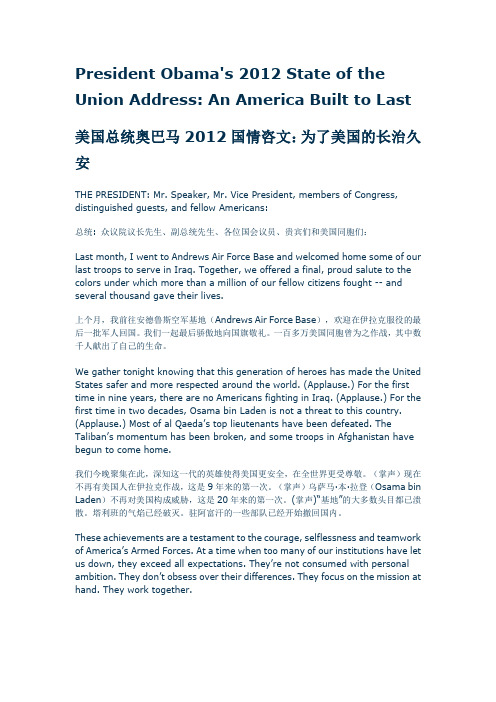
President Obama's 2012 State of the Union Address: An America Built to Last美国总统奥巴马2012国情咨文:为了美国的长治久安THE PRESIDENT: Mr. Speaker, Mr. Vice President, members of Congress, distinguished guests, and fellow Americans:总统: 众议院议长先生、副总统先生、各位国会议员、贵宾们和美国同胞们:Last month, I went to Andrews Air Force Base and welcomed home some of our last troops to serve in Iraq. Together, we offered a final, proud salute to the colors under which more than a million of our fellow citizens fought -- and several thousand gave their lives.上个月,我前往安德鲁斯空军基地(Andrews Air Force Base),欢迎在伊拉克服役的最后一批军人回国。
我们一起最后骄傲地向国旗敬礼。
一百多万美国同胞曾为之作战,其中数千人献出了自己的生命。
We gather tonight knowing that this generation of heroes has made the United States safer and more respected around the world. (Applause.) For the first time in nine years, there are no Americans fighting in Iraq. (Applause.) For the first time in two decades, Osama bin Laden is not a threat to this country. (Applause.) Most of al Qaeda’s top lieutenants have been defeated. The Taliban’s momentum has been broken, and some troops in Afghanistan have begun to come home.我们今晚聚集在此,深知这一代的英雄使得美国更安全,在全世界更受尊敬。
- 1、下载文档前请自行甄别文档内容的完整性,平台不提供额外的编辑、内容补充、找答案等附加服务。
- 2、"仅部分预览"的文档,不可在线预览部分如存在完整性等问题,可反馈申请退款(可完整预览的文档不适用该条件!)。
- 3、如文档侵犯您的权益,请联系客服反馈,我们会尽快为您处理(人工客服工作时间:9:00-18:30)。
历史变迁 国 情 咨 文 的 形 式 始 于 美 国 开 国 初 期,20 世 纪 之 前称为总统年度演讲,20 世纪后才有了国情咨文这一 名称。1790 年1 月8 日,美国首任总统乔治·华盛顿按 宪法要求亲自到国会发表了当时被称作“年度咨文” (Annual Message)的报告,其继任者约翰·亚当斯也是照 此办理。但到了1801 年,美国第三任总统托马斯·杰斐 逊对国会那种盛大礼仪和排场感到厌烦,改为以呈送 书面年度讲话形式取代亲自演说。至此后一百多年期 间里,年度咨文都以书面形式送交国会,而不是由总统 宣读。直到1913 年,伍德罗·威尔逊总统又决定恢复亲 自到国会发表演讲的做法,这一传统一直延续到现在。 1935 年,富兰克林·罗斯福总统首次使用“国情咨文 演说”一词,并在1945 年哈里·杜鲁门总统时期成为正 式名称沿用至今。
52
2012 年 5 月 10 日
泛 读
看世界
要性更在于体现了总统和政府对今后国家发展方向、 政策走向及解决国家面临的一些重大问题的具体思 路。这种施政纲领不仅指导着内政,而且主导着外交走 向,对美国今后若干年的发展具有重大影响。
撰稿过程 咨文演讲稿的撰写过程很复杂,首先是把国家面 临的各种问题梳理清楚,确定重点,然后制定出可行的 解决方案。这是项难度很大的工作,需要白宫各部门之 间的协调与合作。国情咨文的写作由总统讲话撰稿室 负责。撰稿室主任,也就是总撰稿人由总统任命并主持 这项工作。能胜任这项工作的人,必须工作勤奋,能够 读懂总统的思想。撰写小组成员既有撰稿室主任、副主 任、助理演讲撰稿人,也有总统高级顾问和政府相关部 门的人员。 国情咨文是每届美国总统都非常重视的一件事, 因为总统希望通过这个演讲,体现出他与国会和美国 人民进行着成熟和理智的对话,并能够肩负起国家和 时代赋予的重任。按照美国总统的理念,他的演说所针 对的不仅是国会议员和全体国民,而且也是整个世界, 有时是历史时代。据美国现任总统奥巴马的讲话撰稿 室主任法弗罗介绍,演讲稿的撰写工作通常要在总统 的亲自主导和推动下进行,总统从演讲的思路到起草 工作的进展都全程参与。 撰稿小组根据总统提出的想法进行讨论并提出补 充意见,动笔前,需要征求各方政策专家的看法,专门 请教经济、对外政策和国家安全方面等部门,并找研究 机构对演讲所涉及的所有数据进行核实,形成初稿后 交由总统修改。撰稿小组的任务是尽可能通过生动的 文字表述,让总统的意思明确化,把这些想法会对实际 生活产生的具体影响明确化。一篇成稿要几经重写、修 改和调整。 除了文字稿外,还要由新兴媒体专家制作出图文 并茂的演讲网络版,这样做的目的是让演讲中涉及的 各项政策建议具有真实感和人情味,使演讲能够和社 会具体联系起来,能够充分代表美国。总统国情咨文演 讲稿,可以说是团队的共同智慧。
总统在国会演讲中得到的反应是以党派来划限。 如果总统在讲到某些重要议题时有的听众起立鼓掌欢 呼,而有的听众一动不动,面无表情甚至发出嘘声以示 反对,就说明起立鼓掌的是总统所属政党成员,那些不 起立不鼓掌的听众则是反对党成员。还有一个景象,就 是按照惯例,现场出席的联邦最高法院法官对演讲内 容从来不起立、不鼓掌,甚至无表情,以示超脱,显示出 他们代表着国家权力的另一端——司法独立与公正。 参谋长联席会议的成员也是如此,体现着军人不干政, 这是美国政治的一大特色。
2012 年 5 月 10 日
53
时间和出席者 虽然美国宪法规定总统到国会演讲是“不定期” 的,但在人们的理解上是一年一度,所以国情咨文的日 期通常是1 月最后一个星期二晚上。如遇总统交接,则 于2 月份由新总统发表。演讲时长为1 小时左右。
重要意义 国情咨文是美国总统各类演说中最为重要的一个 讲话。它之所以重要,不仅仅是它的受众面大、人数多, 现场听众地位高,几乎包括了美国政府的所有机构和 从国会参众两院到行政部门的各个重要机构。它的重
美国总统发表国情咨文演讲是美国国会的年度大 事之一。每逢这一天,国会参众两院议员、政府内阁部 长、最高法院法官、军方参谋长联席会议成员,以及特 邀来宾和外交使节等聚集一堂,听取总统的重要讲话。 这是美国一年一度的盛大例会,是媒体最集中报道的 事件,也是美国自有了电视转播后收视率最高的一个 节目。不过,每次国情咨文演讲,都会有一位重要内阁 成员怀揣咨文副本在一个秘密地点待命,以防不测事 件或灾难的发生。美国“9·11 事件”发生后,甚至一些 议员也被要求前往秘密地点。
总统在发表国情咨文演讲时一个政党的议员是否 一定要坐在一起?据美国参议院历史学家艾德讲,关 于座位安排没有正式的规定。不同政党的议员既可以 分开坐,也可以搭配着坐。近年来,这种传统正朝着打 破党派界限安排议员座位的方向发展。
2011 年1 月,美国亚里桑那州发生枪击案,众议员 加布里埃尔·吉福兹受重伤生命垂危,议员们为向她表 示支持和团结,决定在参加总统国情咨文演讲时打破 党派界限 :一个共和党议员身边搭配一位民主党议员, 而且议员们可以自己挑选搭档。2012 年1 月24 日,奥巴 马总统在他的任内发表第三次国情咨文演讲时,再次 延续了这一做法。有议员对这样的安排评价说,“和以 前不同的感觉是,跨党派安排座位真正改变了这里的 气氛。”
泛 读
看世界
美国总统年度国情咨文 : பைடு நூலகம்个长达 212 年的传统
□ 洪迎春
国 情 咨 文(the State of Union Address)是 美 国 总 统 每年年初在国会大厦所作的阐述政府施政方针的年度 报告,主要内容是说明国家面临的情况和政府将要采 取的政策措施。总统在国会发表国情咨文,是美国的惯 例,也是其宪法职责。美国宪法第二条第三款规定 :“总 统应不定期向国会报告国情,并将他认为必要和适宜 的议案提交国会审议”。历史学家小阿瑟·施莱辛格在 其所著《总统的国情咨文》一书中写道,“针对美国总 统的平常的文字,随着时代的变迁,如今变成总统处理 国会事宜的一个基本手段和发挥国家领导作用的有力 方式”。
美国总统在国会发表国情咨文已走过212 年的历 程,历经44 任总统。它的传播形式也由开始时面对国 会大厦内的人员和报纸,发展到面向全国乃至全世界 的广播和电视直播,以及目前的电子网络,受众面和影 响力越来越大。
有 些 政 治 观 察 人 士 认 为 ,信 息 传 播 手 段 的 巨 大 效 力 ,特 别 是 国 情 咨 文 在 晚 间 电 视 黄 金 时 间 的 转 播 和 近 年 来 新 兴 媒 体 的 传 播 方 式 ,在 不 断 改 变 着 它 的 原 有 性 质 。总 统 的 国 情 咨 文 已 从 过 去 不 少 人 认 为 是 空洞的政策演说,演变成 “体现美国价值和信念”、 含 有 多 重 意 义 的 重 大 游 说 宣 传 ,主 要 听 众 与 其 说 是 美 国 的 国 会 议 员 ,更 不 如 说 是 美 国 选 民 和 更 广 泛 的 海外听众。
特色与趣象 就国情咨文本身讲,有着其不变和变化的两个特 征。没有变的是 :总统通过国情咨文向民众反映时代 的主旋律和国家遇到的实际问题,推出政策主张和治 国理念,同时涉及国际局势,永恒的主题始终是捍卫 民主和自由,强调美国价值。会场里的人照旧是国会议
员、内阁部长、大法官、军方首领、特邀来宾和外交使节 等,会场还是鼓掌、欢呼以及演讲人在讲话时遇到的嘘 声那一套。变化的是 :演讲的主要内容、涉及的现实问 题、针对的时弊、宣扬和表彰的人和事,以及演讲人的 魅力和风格。至于现场,则是不同党派议员的座位安排 和议员近年来为实时分享结果而根据规则使用的电子 设备。
